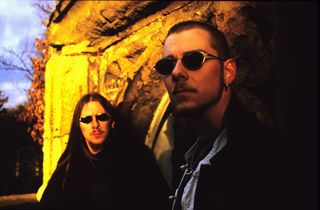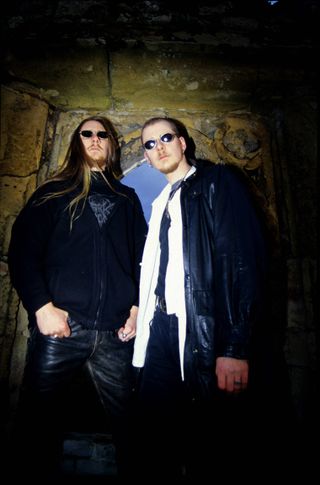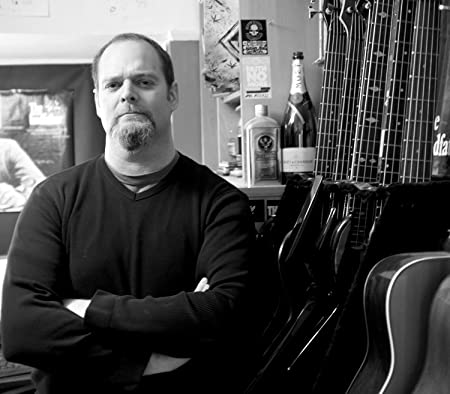“Fuck you!” spits Vegard Sverre Tveitan, known to all as Ihsahn, the singer, guitarist, main songwriter, arranger and linchpin of Emperor, the best black metal band ever to come out of Norway (or anywhere else). “Why do you come now? I don’t need your recognition...” he adds.
“Where I live,” he goes on, “the same people who were the most appalled by us in the early 90s will now tap you on the shoulder and say, ‘Congratulations for your success’. For our critics, it never really mattered what we represented – because to them we represented whatever the hell they wanted!”
But he soon calms down. He chuckles, “You know, I see it from a more sociological point of view. It’s very interesting, being in my position, sometimes.”
Emperor, who split in 2001 after a decade in business, played a surprise three-song show in Oslo on 30 September 2005 at which they announced that they would play a headlining show at Wacken Open Air 2006 in front of 60,000 punters, as well as a US tour. Then they announced a handful of headline shows later that year, including their Hammer-sponsored London gig on October 18 2006, their first UK visit since 1999. But after that, they said, they were calling it a day, for good this time. Most of their huge fan base didn’t know how to react to this, with joy at their heroes’ return, or with sadness at their imminent departure. After all, when you lose something precious and it’s miraculously returned to you, it hurts twice as much when it’s taken away again.

When Ihsahn says that it’s interesting being in his position, he’s understating matters slightly. Consider the following…
Ihsahn and his teenage chum Tomas ‘Samoth’ Haugen first formed a band when they were 13. Influenced by the metal gods of the day (“Celtic Frost and Bathory were the two most influential artists for us, as well as Tormentor from Hungary,” notes the softly-spoken Samoth), the duo played under the names Embryonic and Xerasia before adopting the title Thou Shalt Suffer and recording a demo, aided by the local council. “We got support from the local government – about £400,” recalls Samoth. “We came from a very small community and, because we were one of the first bands to get out and do something, rather than just being a basement band, we were easily noticed. I sat down at my typewriter and filled out an application.” Like a Norwegian Prince’s Trust but with bullet belts, we presume?
Finally landing on the name Emperor – their bassist, Mortiis, lifted it from the song Dethroned Emperor by Celtic Frost – the band signed to the UK’s Candlelight label after impressing the company head Lee Barrett, now of To-Mera. By 1992 they had replaced Mortiis with Tchort and then a series of session players, as well as recruiting Bård ‘Faust’ Eithun on drums and releasing a single and EP. The astonishing 1994 album _In The Nightside__ _Eclipse followed and the rest is literally history with the band’s career until their split in 2001. In fact it’s the stuff of metallic legend.
Norwegian black metal in 1991 and 1992 was a far different beast to the polished, unit-shifting phenomenon we’re used to these days. Churches were burned to the ground; graves were desecrated; and at least three homicides were connected with the scene, including one by drummer Eithun, who spent 10 years in prison after murdering a man in Lillehammer Park in 1992. In subsequent interviews Ihsahn and Samoth (who also served a prison sentence in 1995 for torching a church) have been asked about those early days hundreds, perhaps thousands, of times. Seminal as their later albums were, it seems that we, the great unwashed, can’t get enough of hearing about those gory times.
“I’ve given this a lot of thought,” says Ihsahn, “and as a fan myself I get a very nostalgic attachment to music. I find it hard if a band changes, even if it’s for the better. Iron Maiden, for example: I’m a huge fan of Seventh Son Of A Seventh Son, but when I bought No Prayer For The Dying it disappointed me and I stopped following them. I respect the fact that they had to move on, but I understand that people get attached to certain kinds of music.”

A lot of people are nostalgically attached to the 1992-93 black metal period, when churches were being burned and people were getting killed. Do you think that this is reasonable?
“Both yes and no,” he explains. “We can’t deny the fact that most of the exotic feel of Norwegian black metal came from those things. They made the scene truly extreme, and are what brought it media attention. But as the years passed, and there was no way for us to get credit for being professional musicians because it all came down to church-burning and murder, it took the focus off many, many years of my work. It used to piss me off, frankly, but now I see it more in perspective. I mean, who wants to be confronted with all the stupid shit they did back when they were teenagers?”
Quite. To make things worse for Ihsahn, his band-mates were always in and out of prison, with Eithun, Samoth and even Tchort banged up at various points. But he says: “We never even considered quitting. With this kind of music, facing resistance, it gives you the fighting spirit.
“At the same time,” he adds, “I see that all those things were steps on the way to where I am now. I used to think negatively about being involved in all that, but it confronted me with a lot of extremity that I had to relate to. It led me to today, where I have a moral perspective and my borders are built on actual experience. For many people, the whole black metal thing may be very destructive, so I won’t proclaim it to be extremely positive. This isn’t summer camp.”
Did you ever burn down any churches, Ihsahn?
“No, never. I was never directly involved in anything. Of course, I was psyched up by it at the time, but my focus has always been on the music. I would like to believe that some of my music and lyrics have contributed just as much as symbolic acts.”
Do you still consider yourself a Satanist?
“In situations that suit it, I might bring it up. But in general I don’t feel the need to label myself like that.”
While I’m asking personal questions, what does ‘Ihsahn’ actually mean?
“That is a secret. I think there are only six people who actually know that.”
Go on, make it seven.
“Ha ha! Initially it came from somewhere, but now it’s just an artist’s name. I can assure you that it’s not ‘Nazi’ backwards, as some people have speculated…”
As Emperor fans will recall, one of the reasons the band split in 2001 was because Ihsahn wanted to play epic, progressive material, whereas Samoth and the band’s longstanding drummer Trym Torson fancied a bit of futuristic death metal. The former duly worked with his wife Ihriel in the studio act Peccatum and produced his own, rather stunning solo album The Adversary early in 2006. Samoth and Trym formed the impressively malevolent Zyklon, whose bassist Secthdaemon would handle four-string for the upcoming Emperor shows.
We suggest to Ihsahn that even after five years, a lot of people didn’t understand why Emperor split.
“Look, I’ve played in bands with Samoth since I was 13, and after all those years, people change a lot. If you listen to my solo album and then listen to Zyklon, the musical differences are so obvious. So we agreed that it was better to leave things in a decent way, when we were still enjoying it, rather than keeping on for the wrong reasons.
“A lot of people did not understand why we quit, because it was at the height of our career. But obviously we didn’t start playing extreme black metal in 1991 to please public opinion. The reason why we touched a lot of people, I hope, was because we contributed good music. And the reason we can come back after five years, with such a dedicated fanbase, is due to the fact that we quit when we thought we couldn’t do it properly anymore. I think we did it for the right reasons all along, and so we kept our integrity. There’s no bullshit.”
- Behemoth: Nergal's Guide To Life
- Ihsahn on Arktis, breaking the mould and what he thinks of Emperor's legacy
- The top 10 best Emperor songs
- Emperor confirm 2017 reunion
So is this really the end of Emperor?
“People are hoping for a new album and so on, but that’d be playing ourselves and our fans for fools.”
But what happens in 10 years, say, when some fat-cat promoter offers you a gazillion dollars to reform and tour?
“If this was just about money, the best idea would be to reform now!” sniggers the frontman. “I’ve been lucky as I’ve been dealing with Candlelight Records now for 16 years and I’ve had a professional music career, doing exactly what I wanted, not compromising or saying, ‘Let’s tweak this song to make more money’, or, ‘Let’s make a hit single’, or anything like that. And I would like to honour that privilege for myself by continuing to be a free musician. I appreciate the fact that so many people would like to see us back together, but I owe it to the fans to keep that integrity and make music from my heart and soul. I know it sounds pompous and clichéd, but that’s the way I see it.”
Come on, you haven’t answered our question about the promoter and his big bag of money.
“OK,” muses Ihsahn, “if fate had it that someone brought it up again in some kind of concept… it’s impossible to say. Initially I said, ‘There will never be any Emperor shows again’. And here we are! Of course, things change. For me, personally, I needed five years away from all of that to get the right perspective again. Emperor is not big in the music industry at all, but with all the expectations on Emperor – and what people wanted it to be – it came so far away from what I actually wanted it to be. These things are hard to explain… I think record companies find it hard to understand that, ‘This is my art!’”
Ihsahn seems to be laughing at himself – we have to admit that we’re impressed…
What does Samoth have to say about the possibility of a new Emperor album?
“Never say never,” he states flatly, “but it doesn’t look very realistic at the moment. The basis for this live reunion is just to do these final shows that we never got the chance to do at the time – it felt unfinished. Now we’re ending the era of Emperor, so it makes a lot of sense for us to do these shows.”
However, thanks to the sort of bureaucratic bullshit that makes entry to the US something of a lottery these days, Samoth wasn’t able to accompany the band on the American shows.
“They gave me my US visa five days after the rest of the band returned from the tour!” he explains, evidently still annoyed. “We tried every possible angle to get it done more quickly, but no. It’s the FBI who handle it in America and you cannot communicate directly with them. When you have a past criminal record you have to apply for something called a waiver, and that is handled by another office, which approves your entry into the States. But I’ve had many visas before and it was never an issue then, and it wasn’t an issue now, it was just a timing problem. It sucked a lot for me sitting at home! It was supposed to be one of the highlights of my career, and instead it was a fucking nightmare.”
But the bigger picture is good, As Samoth concludes:
“Anyway, the tour was a success, because we have a very strong and loyal fanbase in America. In some ways it even bonded the band and the fans even more strongly, because everyone was more motivated to make this even more of a special event and to have fun with it. This year’s Wacken show was the biggest gig I’ve ever played. I got quite emotional during some of the songs.”

C’mon Samoth, it must be a bit sad saying goodbye to Emperor after all these years?
He still won’t budge, saying: “The thing is, I’m not thinking of this as a goodbye. I’m enjoying it, having fun with it and that’s my focus.”
Nonetheless, this is definitely the end of Emperor’s career, right?
“Yes, but I don’t feel sad about it, I feel excited about it. In a way this is a bonus as we didn’t know these shows were going to happen. We said, ‘if we’re going to do it, let’s do it so there’s no pressure from anybody.’ And we’re very excited about playing in England too.
“We have a very strong link with your country because of Candlelight, where we’ve been signed since 1993. And we had our first tour in England. With Cradle Of Filth.”
You should do an album called Hail To England, we tell him. Samoth laughs politely, no doubt thinking, ‘Who is this dick of a journo?’
Even the mild-mannered drummer Trym won’t be badgered into speculating about Emperor’s future, merely saying: “This is a closure that we were supposed to have. It’s both sad and good at the same time, because we now know that this is the final thing we will do.”
Final as in really final?
“Never say never. This reunion was never planned. We thought there would never be any more shows. But we don’t want to be like Kiss or someone who looks old! It could happen, but I wouldn’t rely on it…” Let’s leave the last words to Ihsahn, who concludes:
“I see these shows as a revisit. Since we quit in 2001 we’ve had so many offers to reform – so we thought, ‘If we’re going to do this, we might as well do it now, after five years rather than 10.’
“Some reunions are like a parody, you know, and we wanted to do this in a good way.”
He sits back in order to sum up…
“Because of Wacken, and the sold-out shows we played in America – we saw people who had flown in specially from Australia and Japan! – it’s a great privilege to be in that situation, and to see that what we did for 15 years made sense to a lot of people.”
Emperor were a band like no other and they would be true to their word: this was the end. (Or at least it would be - until the announcement of their re-formation in summer 2013…)
Farewell Ihsahn, Samoth and Trym – we were missing you already…
This article originally appeared in Metal Hammer #158.


